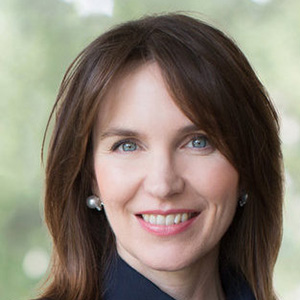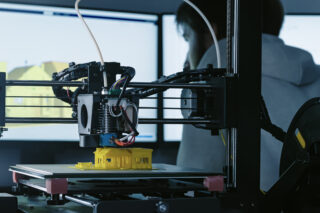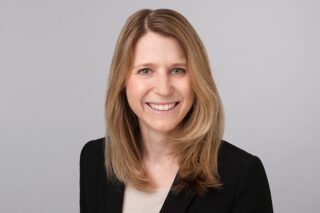





Robert Förster (EMBA 59), NZZ-Award Winner
Robert, how are you doing? Some time has passed since graduating and receiving the NZZ Award?

My EMBA time was very special, exciting and inspiring and I like to look back to it. The necessity of constant transformation which was addressed and almost indoctrinated during our studies is still part of my daily business today. Be it job or private – there are many connections to EMBA students from different cohorts in my daily life and it is really nice to already share that special bond. This is unique! Our EMBA 59 cohort is meeting on a regular basis in bigger and smaller groups and I cherish each time because they are all such special personalities. The bond, the mutual experiences and the great community were and still are a huge enrichment for all of us. For me personally, the NZZ Award stands out as well, for sure.
Let us go back to graduation night. You already knew your outstanding grade for your master’s thesis – but did you think about the award at all?
The award was a complete surprise for me on the night of the graduation. I never thought that my master thesis would impress the jury that much that I would be awarded the “NZZ-Preis”. I was fortunate to study alongside many brilliant colleagues, so I felt extremely honoured that my thesis was picked out for the award. That gave that great and emotional evening another special touch.
Your master thesis was a feasibility study on implementing a highly technologized radiation method at the Kantonsspital Winterthur – how did the topic develop?
We developed the topic throughout several meetings but it was very clear from the beginning, that it would be a good one for the master’s thesis. At the Kantonsspital Winterthur, we thankfully think constantly about how our regional medical supply may be enhanced or broadened. On a regular basis, also out of the box ideas are followed. This innovative spirit is very important for the daily work of clinical research, especially in oncology.
In what capacity are the contents as well as the considerations of your thesis still part of your daily business?
My thesis was the crucial reason why other innovative projects within the radio-oncology of the Kantonsspital Winterthur were realized with special emphasis. As for myself, I am still working in specialized patient care and clinical research.
Feasibility studies have a very clear question: economic efficiency vs. high-level health care. Are there two hearts beating in your body?
Due to our health system, this is what everybody in the health industry is dealing with, to a bigger or smaller extent. Economic efficiency needs to be given generally, even if parts of the hospitals and other health facilities are in deficit. At the same time, these services need to be provided because they are essential for a sufficient health coverage. But thinking this through, it also means that these services need to be balanced.
What did this core question do with you personally?
Well, generally it is nothing new that we in the medical business are confronted with economical aspects. But of course, topics like marketing, leadership and strategy were looked at intensely and thoroughly. In the end, that was why I chose the EMBA program: to understand as a medical professional what my hospital colleagues in the controlling and finance department think. After the EMBA I can say that I understand and speak the language of controlling and management. The way of thinking is completely different from what is being taught during medical studies. It is relevant for specific services within a hospital or health institution.
Nowadays, if you want to develop further within the medical industry or want to take over more responsibility within management, studies like the EMBA are essential. It also makes finding solutions mutually in daily business easier and that consequently leads to better health care for the society in our region.
There are many medical professionals deciding in favour of an EMBA – some for career planning, some, as you put it, „to speak the language of controllers“. How do you see this development?
Since eleven years I have been working in clinical medicine and research. At least since then, there is a development that many of my colleagues add an economic education. In my view, this is a necessity because it is exactly what is often ask by the hospital management. For me as an executive employee, it is certain that everyone needs to have at least some parts of this education such as leadership skills and personnel management. Additionally, it is important to broaden your view: the health community itself is quite closed to the outside. You often speak about the same problems over and over again and do not get inputs or perspectives from the outside. I believe it is highly important to see what is happening outside the health sector. The Executive MBA at the University of St.Gallen is an excellent program with a great reputation, and I am very happy to be a part of the EMBA community.
Let us look back at your time in St. Gallen for the last question. Was there a class that has stuck with you or given you something extra special that has stuck with you?
I personally took something from every class, something even small things that simply stuck in my head. Spontaneously, I remember one of the very first classes with Karolin Frankenberger. Christoph Keese, Head of Axel Springer, was there – really a stunning personality. He said a very important sentence:
“Digitalization does not mean the digital version of an analogue procedure.”
That is exactly, what we do very often, especially in the health system. I will forever remember this sentence and it has shaped me and my thinking ever since. I am confident that we can rely on this sentence in shaping the health system for the good of everyone.
 EMBA HSG Impact, News
EMBA HSG Impact, News
 EMBA HSG Impact
EMBA HSG Impact
Do you have any questions or require further information? We will be happy to help.